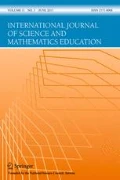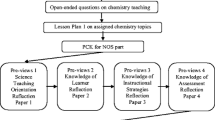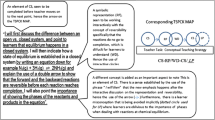Abstract
In chemical education, many secondary school students experience difficulties in understanding three mutual related meanings of topics, that is, the macroscopic meaning, the microscopic meaning, and the symbolic meaning. As a consequence, student teachers should be prepared carefully to learn how to teach this difficult issue. This article presents a naturalistic case study of the development of eight student teachers’ pedagogical content knowledge (PCK) of the multiple meanings of chemistry topics. The student teachers (all M.Sc.) participated in a teacher education program of which the initial phase focused on learning from teaching instead of learning of teaching. They were asked individually to choose and teach a chemistry curriculum topic with a focus on the macro-micro-symbolic issue. Research data were obtained by interviewing the student teachers individually before and after the lessons. The outcomes indicated a development of student teachers’ knowledge of teaching difficulties, for instance, too fast and mainly implicit reasoning between macro- and micro-meaning, and a dominant orientation towards the micro-meaning of topics. A development of knowledge of students’ difficulties was also indicated, for instance, difficulties in understanding the macro- and micro-meaning of reaction equations. Implications for the follow-up phases of the program are presented.
Similar content being viewed by others
References
Abraham, M.R., Grzybowski, E.B. & Renner, J.W. (1992). Understandings and misunderstandings of eight graders of five chemistry concepts found in textbooks. Journal of Research in Science Teaching, 29, 105–120.
Benson, D.L., Wittrock, M.C. & Bauer, M.E. (1993). Students’ preconceptions of the nature of gases. Journal of Research in Science Teaching, 30, 587–597.
Ben-Zvi, R., Eylon, B. & Silberstein, J. (1988). Theories, principles and laws. Education in Chemistry, 25, 89–92.
Cochran, K.F., DeRuiter, J.A. & King, R.A. (1993). Pedagogical content knowledge: An integrative model for teacher preparation. Journal of Teacher Education, 44, 263–272.
De Jong, O., Acampo, J. & Verdonk, A.H. (1995). Problems in teaching the topic of redox reactions: Actions and conceptions of chemistry teachers. Journal of Research in Science Teaching, 32, 1097–1110.
Denzin, N.K. (1994). The art and politics of interpretation. In N.K. Denzin & Y.S. Lincoln (Eds.), Handbook of qualitative research design (pp. 500–515). Thousand Oaks: Sage.
Friedel, A.W. & Maloney, D.P. (1992). An exploratory, classroom-based investigation of students’ difficulties with subscripts in chemical formulas. Science Education, 76, 65–78.
Geddis, A.N. (1993). Transforming subject-matter knowledge: The role of pedagogical content knowledge in learning to reflect on teaching. International Journal of Science Education, 15, 673–683.
Grossman, P.L. (1990). The making of a teacher: Teacher knowledge and teacher education. New York/London: Teachers College Press.
Harrison, A.G. & Treagust, D.F. (2002). The particulate nature of matter: Challenges in understanding the submicroscopic world. In J. Gilbert, O. De Jong, R. Justi, D.F. Treagust & J. Van Driel (Eds.), Chemical education: Towards research-based practice (pp. 189–212). Dordrecht/Boston: Kluwer Academic Publishers.
Janesick, V.J. (1994). The dance of qualitative research design. In N.K. Denzin & Y.S. Lincoln (Eds.), Handbook of qualitative research design (pp. 209–219). Thousand Oaks, CA: Sage.
Johnson, P. (2002). Children’s understanding of substances, Part 2: Explaining chemical change. International Journal of Science Education, 24, 1037–1054.
Johnstone, A.H. (1991). Why is science difficult to learn? Things are seldom what they seem. Journal of Computer Assisted Instruction, 7, 75–83.
Johnstone, A.H. (1993). The development of chemistry teaching: A changing response to changing demand. Journal of Chemical Education, 70, 701–705.
Lampert, M. & Loewenberg, D.B. (1998). Teaching, multimedia, and mathematics: Investigations of real practice. New York: Teachers College, Columbia University.
Lederman, N.G., Gess-Newsome, J. & Latz, M.S. (1994). The nature and development of preservice science teachers’ conceptions of subject matter and pedagogy. Journal of Research in Science Teaching, 31, 129–146.
Lee, O., Eichinger, D.C., Anderson, C.W., Berkheimer, G.D. & Blakeslee, T.D. (1993). Changing middle school students’ conceptions of matter and molecules. Journal of Research in Science Teaching, 30, 249–270.
Loughran, J.J., Milroy, P., Berry, A., Gunstone, R. & Mulhall, P. (2001). Documenting science teachers’ pedagogical content knowledge through PaP-eRs. Research in Science Education, 31, 289–307.
Magnusson, S., Krajcik, J. & Borko, H. (1999). Nature, sources, and development of pedagogical content knowledge. In J. Gess-Newsome & N.G. Lederman (Eds.), Examining pedagogical content knowledge (pp. 95–132). Dordrecht, The Netherlands: Kluwer Academic Publishers.
Marks, R. (1990). Pedagogical content knowledge: From a mathematical case to a modified conception. Journal of Teacher Education, 41, 3–11.
Sanders, L.R., Borko, H. & Lockard, J.D. (1993). Secondary science teachers’ knowledge base when teaching science courses in and out of their area of certification. Journal of Research in Science Teaching, 30, 723–736.
Shulman, L.S. (1986). Those who understand: Knowledge growth in teaching. Educational Researcher, 15, 4–14.
Tobin, K., Tippins, D.J. & Gallard, A.J. (1994). Research on instructional strategies for teaching science. In D.L. Gabel (Ed.), Handbook of research on science teaching and learning (pp. 45–93). New York: Macmillan.
Treagust, D.F., Chittleborough, G. & Mamiala, T.L. (2003). The role of submicroscopic and symbolic representations in chemical explanations. International Journal of Science Education, 25, 1353–1368.
Yager, R.E. (1983). The importance of terminology in teaching K-12 science. Journal of Teacher Education, 20, 577–588.
Yore, L.D. (1991). Secondary science teachers’ attitudes toward and beliefs about science reading and science textbooks. Journal of Research in Science Teaching, 28, 55–72.
Author information
Authors and Affiliations
Corresponding author
Rights and permissions
About this article
Cite this article
De Jong, O., Van Driel, J. Exploring the Development of Student Teachers’ PCK of the Multiple Meanings of Chemistry Topics. Int J Sci Math Educ 2, 477–491 (2004). https://doi.org/10.1007/s10763-004-4197-x
Published:
Issue Date:
DOI: https://doi.org/10.1007/s10763-004-4197-x




